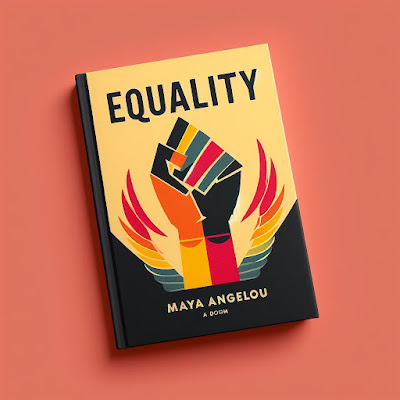Equality by Maya Angelou
Equality by Maya Angelou
This blog task is assigned by Prof. Vipul Dabhi Sir. Click here to see the teacher's blog.
{getToc} $title={Table of Contents} $count={false}
Q.-1.|What's your understanding of the poem Equality?
Answer:
Maya Angelou's poem "Equality" is a powerful call for freedom and justice.
First Stanza:
"You declare you see me dimlythrough a glass which will not shine,though I stand before you boldly,trim in rank and marking time.You do own to hear me faintlyas a whisper out of range,while my drums beat out the messageand the rhythms never change."
The speaker begins by confronting the listener's perception, suggesting they see her "dimly through a glass which will not shine," indicating a lack of clarity or willingness to see her true self. Despite standing "boldly," she feels unheard, like "a whisper out of range." The "drums" symbolize her persistent message for equality, a rhythm that remains constant.
Chorus:
"Equality, and I will be free.Equality, and I will be free."
The refrain "Equality, and I will be free" is a declaration of the speaker's desire for equal status, which she equates with freedom.
Second Stanza:
"You announce my ways are wanton,that I fly from man to man,but if I'm just a shadow to you,could you ever understand?We have lived a painful history,we know the shameful past,but I keep on marching forward,and you keep on coming last."
She addresses misconceptions about her character, being judged as "wanton" and accused of inconstancy. However, she questions if they truly understand her, given they only see a "shadow."
The history of pain and shame is acknowledged, but the speaker emphasizes her determination to move forward, contrasting with the listener who remains behind.
Chorus:
"Equality, and I will be free.Equality, and I will be free."
The speaker repeats the same lines, reinforcing the crucial message that "Equality, and I will be free" serves as a powerful refrain, emphasizing the speaker's unwavering belief in equality as a pathway to freedom.
Third Stanza:
"Take the blinders from your vision,take the padding from your ears,and confess you've heard me crying,and admit you've seen my tears.Hear the tempo so compelling,hear the blood throb in my veins.Yes, my drums are beating nightly,and the rhythms never change."
The speaker urges the listener to remove their "blinders" and "padding," to truly listen and see the speaker's struggle and tears. The compelling "tempo" and the "blood throb" in her veins signify her life force and enduring spirit.
Chorus:
"Equality, and I will be free.Equality, and I will be free."
The poem concludes with the repeated chorus, reinforcing the speaker's unwavering demand for equality and freedom.
Angelou uses metaphor, imagery, and repetition to convey her message. The "glass" metaphor suggests a barrier to understanding, while "drums" and "rhythms" symbolize the ongoing struggle for civil rights. The poem's structure, with its repeating chorus, mirrors the persistent fight for equality. Angelou's call for equality is not just personal but represents a collective voice seeking to be heard and understood. Her poem remains a relevant and inspiring call to action for justice and equality.
In the context of India, the poem’s themes echo the harsh realities faced by women and lower castes. Women in India, despite some progress, continue to grapple with gender discrimination, violence, and unequal opportunities. They strive for equality in a society that often dims their presence and silences their voices, much like the speaker in Angelou’s poem.
Casteism in India presents a parallel to the poem’s motifs of visibility and audibility. The “glass” and “whispers” can be likened to the social barriers that prevent lower castes from being fully seen and heard in society. Despite legal protections, discrimination persists in urban and rural settings, with caste-based violence and exclusion still prevalent.
The dominance of upper castes in India’s socio-political landscape mirrors the poem’s narrative of an oppressor who fails to recognize the oppressed’s march towards equality. Upper castes have historically held most of the main positions, often at the expense of lower castes who face systemic oppression.
Angelou’s “Equality” resonates with the call for freedom and justice in India, where women and lower castes continue to beat their drums for equality, hoping for a future where their rhythms of resistance change the existing conditions and lead to true freedom.
Q.-2.|Write a poem on the theme of equality.
Answer:
In the vast and diverse land of India,where there is a shadow of inequality,women face harsh, unequal plight,their voices silenced, their dreams blown away.In the midst of the nation that divided that tear,the lower castes, burdened with despair,the struggle against the chains of oppression,in a society of discrimination.In the corridors of power, some privileged,upper castes, their dominance increased,While on the margins, they strive and toil,Deprived of opportunities, their dreams turn upside down.Yet in the heart of this uneven region,hope shines, ever approaching,The fight for equality is strong,In a group of voices, united and long.Let us stand hand in hand, shoulder to shoulder,in pursuit of justice,let us remain for a nation that is truly free and fair, where equality reigns, beyond comparison.

